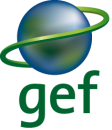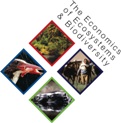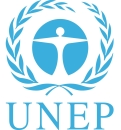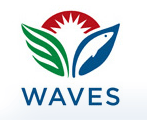 |
The Global Environment Facility (GEF), in its fifth replenishment cycle, builds on proposed refinements to the GEF strategy’s objectives based on CBD COP-9 guidance, advances in conservation practice, and advice from the GEF’s Scientific and Technical Advisory Panel. The goal of the biodiversity focal area is the conservation and sustainable use of biodiversity and the maintenance of ecosystem goods and services. To achieve this goal, the strategy encompasses five objectives:- improve the sustainability of protected area systems;
- mainstream biodiversity conservation and sustainable use into production landscapes/seascapes and sectors;
- build capacity to implement the Cartagena Protocol on Biosafety;
- build capacity on access to genetic resources and benefit-sharing; and
- integrate CBD obligations into national planning processes through enabling activities.
|
 |
The Economics of Ecosystems and Biodiversity (TEEB) is a global initiative focused on drawing attention to the economic benefits of biodiversity. Its objective is to highlight the growing cost of biodiversity loss and ecosystem degradation. TEEB presents an approach that can help decision-makers recognize, demonstrate and capture the values of ecosystems and biodiversity, including how to incorporate these values into decision-making. TEEB’s evolution has been marked by three main phases:- The TEEB Interim Report, which was launched at CBD COP 9 in 2008 laid a broad foundation where evidence and examples of valuation were collated, elements of a biodiversity/ecosystem valuation framework identified, and long standing issues such as ethics in making choices regarding future values were re-emphasized.
- Additional analyses, some launched at the CBD COP 10 in 2010 and other on-going including on fundamental concepts and state-of-the-art methodologies for economic valuation of biodiversity and ecosystem services; analysis and guidance on how to value and internalize biodiversity and ecosystem values in national, regional and local level policy decisions; and specific studies relevant to the private sector, cities, water and wetlands, oceans and climate change.
- Capitalizing on the momentum created from the TEEB Study reports and network of partners, the initiative has now moved into a phase of implementation at the country level. This shift responds to numerous requests and interest by governments to build national, regional and local government capacity to produce tailored economic assessments of ecosystems and biodiversity, and support to mainstream this information into policy-making.
The TEEB study follows a tiered approach in analyzing and structuring valuation guided by three core principles:- Recognizing value in ecosystems, landscapes, species and other aspects of biodiversity is a feature of all human societies and communities and is sometimes sufficient to ensure conservation and sustainable use. For example the existence of sacred groves in some cultures has helped to protect natural areas and the biodiversity they contain.
- Demonstrating value in economic terms is often useful for policy makers and others such as business in reaching decisions that consider the full costs and benefits of an ecosystem rather than just those costs or values that enter the markets in the form of private goods. An example would include calculating the costs and benefits of conserving the ecosystem services provided by wetlands in controlling floods compared to building flood defences. The demonstration of an economic value even though it does not result in specific measures is an important aid in achieving efficient use of natural resources.
- Capturing value involves the introduction of mechanisms that incorporate the values of ecosystems into decision-making through incentives and price signals. This can include payments for ecosystem services, reforming environmentally harmful subsidies or introducing tax breaks for conservation.
|
 |
The Biodiversity Finance Initiative (BIOFIN), managed by the UNDP Ecosystems and Biodiversity Programme, is a global partnership seeking to address the biodiversity finance challenge. It is building a sound bottom-up business case for increased investment in the management of ecosystems and biodiversity by taking a particular focus on the needs and transformational opportunities at the national level. It operates along two main axes: - Globally-led development of a new methodological framework
- Adaptation and implementation of this new methodological framework at national level
To help countries increase the importance attributed to biodiversity, and thereby bridge the financing gap, the work at national level will be led by Ministries of Finance, Planning or Economics and the Ministry of Environment, and is articulated through the following components:- Analyse the integration of biodiversity and ecosystem services in sectoral and development policy, planning and budgeting
- Assess future financing flows, needs and gaps for managing and conserving biodiversity and ecosystem services
- Develop comprehensive national Resource Mobilisation Strategies to meet the biodiversity finance gap
- Initiate implementation of the Resource Mobilisation Strategy at national level
In addition to working with a number of countries directly, tools developed through BIOFIN will additionally be applied in a broader constituency of countries that UNDP is supporting to develop “new generation” National Biodiversity Strategy and Action Plans (NBSAPs).
Download the BIOFIN workplan and summary guide from the documents page.
|
 |
The United Nations Environment Programme (UNEP)-led Green Economy Initiative, launched in late 2008, consists of several components whose collective overall objective is to provide the analysis and policy support for investing in green sectors and in greening environmental unfriendly sectors. Within UNEP, the Green Economy Initiative includes three sets of activities: - Producing a Green Economy Report and related research materials, which will analyse the macroeconomic, sustainability, and poverty reduction implications of green investment in a range of sectors from renewable energy to sustainable agriculture and providing guidance on policies that can catalyze increased investment in these sectors.
- Providing advisory services on ways to move towards a green economy in specific countries.
- Engaging a wide range of research, non-governmental organizations, business and UN partners in implementing the Green Economy Initiative.
|
 |
Recognizing the need for significant mobilization of resources from a variety of sources and the effective use of financing in order to give support developing countries in their efforts to promote sustainable development, the Intergovernmental Committee of Experts on Sustainable Development Financing was established in June 2013 under the auspices of the General Assembly, with technical support from the United Nations system.
The process is carried out through open and broad consultation with relevant international and regional financial institutions and other relevant stakeholders to assess financing needs, consider the effectiveness, consistency and synergies of existing instruments and frameworks, and evaluate additional initiatives, with a view to preparing a report proposing options on an effective sustainable development financing strategy to facilitate the mobilization of resources and their effective use in achieving sustainable development objectives.
It is supported by the working group of the UN System Task Team (UNTT) on Financing for Sustainable Development, which was set up to inform the ongoing deliberations on the United Nations Development Agenda beyond 2015. The working group is to produce background material on financing for sustainable development, taking as much as possible an integrated perspective that addresses social, environmental, and economic dimensions. This work reflects the state of knowledge on specific areas, based on existing work of UN agencies.
|
 |
Wealth Accounting and the Valuation of Ecosystem Services (WAVES) is a global partnership that aims to promote sustainable development by ensuring that natural resources are mainstreamed in development planning and national economic accounts. This global partnership brings together a broad coalition of UN agencies, governments, international institutes, nongovernment organisations and academics to implement environmental accounting where there are internationally agreed standards, and develop standard approaches for other ecosystem service accounts.
By working with central banks and ministries of finance and planning across the world to integrate natural resources into development planning through environmental accounting, it hopes to enable more informed decision making that can ensure genuine green growth and long-term advances in wealth and human well-being.
The objectives of the WAVES partnership are to: - Establish environmental accounts in six to ten countries and incorporate these into national policy analysis and development planning
- Develop internationally-agreed guidelines for ecosystem accounting
- Spread environmental accounting through a global partnership
|